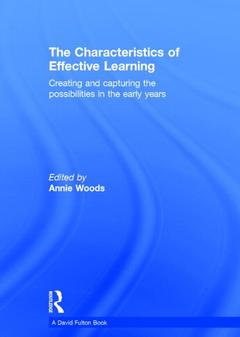The Characteristics of Effective Learning Creating and capturing the possibilities in the early years
Coordonnateur : Woods Annie

The characteristics of effective learning ? playing and exploring, active learning and creating and thinking critically ? underpin young children?s learning and development and are central to the revised Early Years Foundation Stage. Practitioners need to be confident of planning, observing and assessing characteristics of effective learners and understand how they support children?s learning and development.
The book explores what the characteristics of effective learning look like and how practitioners can create opportunities for children to express them. It considers the ways in which they connect with children?s natural explorations, play, enjoyement and the environments created by adults. Throughout the focus is on building on children?s own interests as practitioners plan for, observe and assess playing and exploring, active learning and creativity and critical thinking.
Including encounters from authentic settings and provocative questions for reflective practice, the book covers:
- children?s well-being and motivations
- creating effective learning possibilities for all children
- engaging children?s interests
- the role of the adult and environment
- sustained shared thinking
This timely new text aims to help practitioners and students develop their understanding of the charactersitics of effective learning and show them how they can support young children in become effective and motivated learners.
1. Children are Naturally Playful 2. Exploring Children’s Well-being and Motivations 3. Creating Effective Learning Possibilities for all Children 4. Children’s Engaging Interests 5. Playing with Thinking 6. Guiding Children’s Participation 7. Sustained Shared Conversations 8. Capturing the Possibilities
Annie Woods is Senior Lecturer in Early Years at Nottingham Trent University, UK.
Date de parution : 09-2014
17.4x24.6 cm
Disponible chez l'éditeur (délai d'approvisionnement : 14 jours).
Prix indicatif 160,25 €
Ajouter au panierDate de parution : 09-2014
17.4x24.6 cm
Disponible chez l'éditeur (délai d'approvisionnement : 14 jours).
Prix indicatif 40,18 €
Ajouter au panierThème de The Characteristics of Effective Learning :
Mots-clés :
Round Windows; Annie Woods; EYFS Statutory Framework; Characteristics of Effective Learning; Zealand Early Childhood Centres; Early Years Foundation Stage; Infant Toddler Centres; EYFS; High Quality Preschool Experience; Early Years; Play Store; Play and Learning; People's Actual Involvement; Active Learning; Face Difficult Choices; Playing and Exploration; EPPE Project; Creativity and Critical Thinking; Children's Unique Characteristics; Child Initated Play and Learning; Playing Back; Nancy Stewart; Children's Social Play; Di Chivers; Independent Future Learners; Anni McTavish; Foundation Stage Teacher; Helen Moylett; Recording Routes; Planning; Observation; Knowledge Acquisition; Assessment; Effective Early Learning; Sustained Shared Thinking; Sen; Vicky McEwan; Reflective Practice; Lorna Wardle; EYFS Requirement; Sharon Vest; Treasure Basket; Val Hall; Deep Level Learning; Catherine Gripton; Forest School; Victoria Brown; Making Table; Catherin Moran



